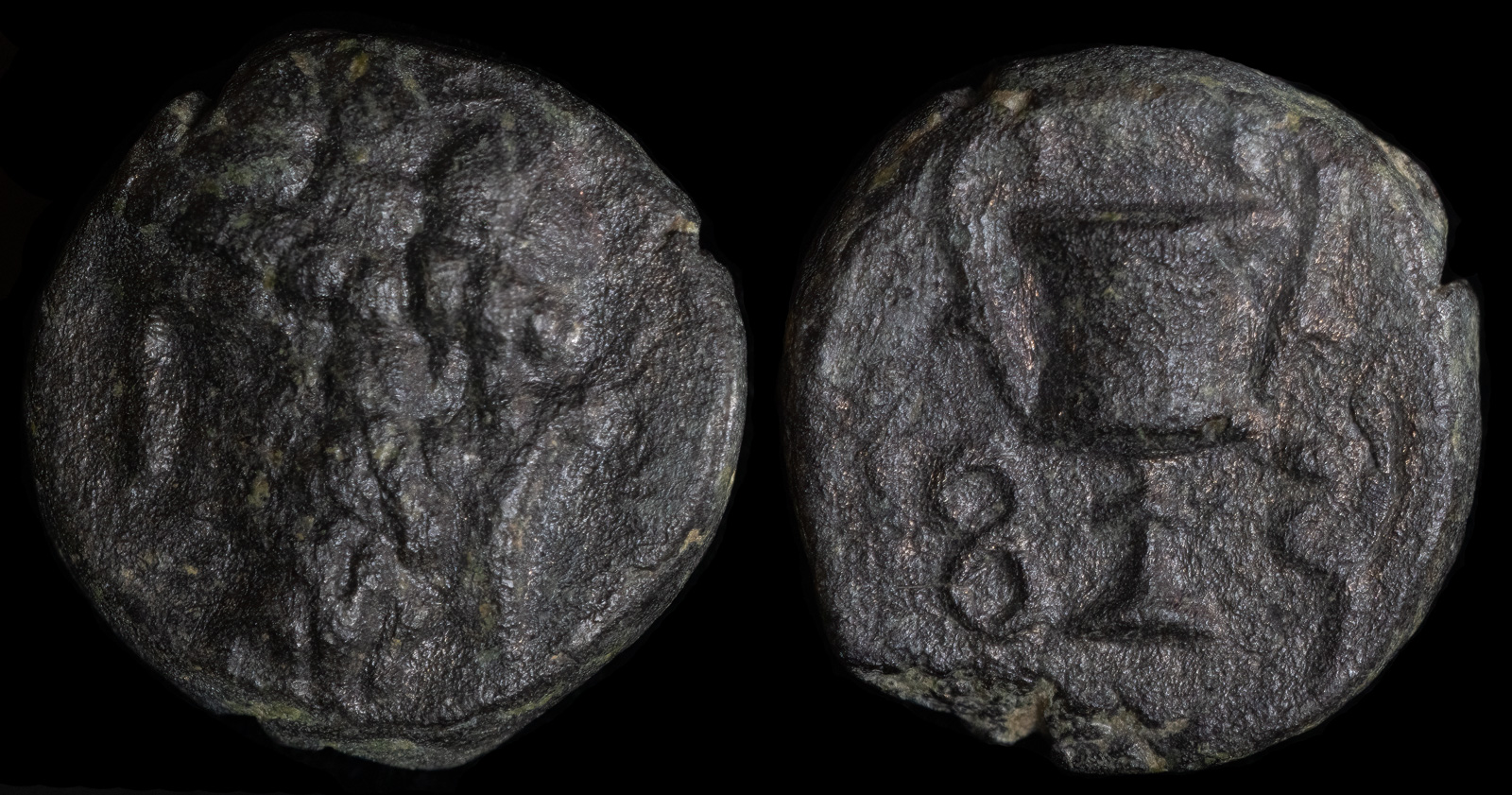
circa 350-300 BCE
Æ 11 mm, 1,90 g
Head of Dionysios left, wearing ivy wreath
Kantharos; F (in Lydian) and S (in Lydian) flanking
Vögtli, Pergamon 524
Ex Savoca
Recently, I noticed this coin at auction and was immediately intrigued. To the left and the right of the kantharos were symbols that clearly weren’t Greek. The only attribution was “Lydia. Uncertain mint.” I had to take up this mystery.
Given the attribution, I assumed the language was Lydian and a quick search verified that, though I was initially confused because I mistook the handle of the kantharos for an “I”, which didn’t exist in Lydian. To the left of the cup is an ‘f’ (look like an 8 ) and to the right is an ‘s’. Lydian during that period was read right to left so we have ‘sf’. Interestingly, very early texts of Lydian were left to right, but by the 4th century it was right to left. Maybe they ran out of paper, so they had to go the other way?
For a long time, these issues were mis-attributed as Syros. Why? What is especially intriguing about this issue is its complete similarity to those of Naxos in the Cyclades(no photo since I haven’t acquired one yet). The Naxos issue has the exact same obverse and reverse, but N – A in Greek letters instead of the Lydian. Earlier, numismatists took the ‘s’ to mean the nearby island of Syros. I’m honestly not sure why they didn’t catch the Lydian ‘8’.
In 1993, Hans Vögtli published “Die Fundmünzen aus der Stadtgrabung von Pergamon“, an online copy of which I cannot find, but which was cited by CNG and Leu. I presume, based on the title, that he found some of these coins near Pergamon and did the math. Roughly twenty-two years later, someone finally read it and CNG and Leu changed their attributions.
While the city is still officially ‘uncertain’, pretty strong signs point to Sardis. The following is the reasoning
The letters on the coin are clearly Lydian
Sardis was by far the most important city in Lydia at the time
There is no other known coinage from Sardis at the time, despite its importance
‘Sardis’ in Lydian is ‘sfard’
Of course, I was initially excited at the word ‘sfard’ because I thought it may be the origins of the word ‘sephardic’. Could my ancient ancestors have come from Lydia? Unlikely. The word Sephardic comes from the ancient word for Spain (Sefarad). Of course, one of my ancestors could have stayed at an Airbnb in Sardis at some point and I will never know.
Going back to the Naxos examples, that has me curious. There are a number of examples of cities issuing similar coinage, but Sardis and Naxos would make odd bedfellows. The two weren’t exactly close to each other, and Sardis was an inland power without much of a navy. Perhaps the Naxos coins are also mis-attributed? I looked for coins that began with ‘Na’ in my Barrington Atlas and did find a ‘Nakrason’ roughly 80 km north of Sardis. The route would have been through valleys, so they would have been reachable from each other. Barrington lists the site of Nakrason as uncertain, so it may have been closer. Nevertheless, the distance could have been enough that they used Greek instead of Lydian, which was a shrinking language at the time.
This is just a conjecture, but I do wonder. Given that the earlier attribution of Syros validated the Naxos attribution, that’s no longer the case. Now the known coins of Syros (don’t yet have an example) were minted a bit later and had a very different design. Of course, if these coins have been found in Naxos, then it’s a different matter (and interesting for other reasons – did the two cities trade or form an alliance?)
Picking up this coin was extremely important to me. While I do have a Persian siglos attributed to Sardis, I always prefer local coins with the city’s name. More important, though, was the tiny coin’s link to a now deceased language.
We have very few remnants of ancient Lydian left, though linguists have deciphered several hundred words. Nevertheless, imagine all of the works in Lydian that have disappeared. We don’t know the standard Lydian greeting in the morning, nor can we order a pizza in Lydian. There may have been significant poetry and stories that are now completely lost. Think of all the Lydian comic books blown to the dust – characters that have disappeared long before Disney had the opportunity to acquire them.
Two words supposedly come to us from Lydian. The first is Labrys, which is a double headed axe. Had I not collected Macedonian coins, which were fond of double-headed axes, I would not have known this word. The other is Tyrant. We’re not entirely sure that word’s from Lydian, but they did have a lot of tyrants around, so it would make sense.